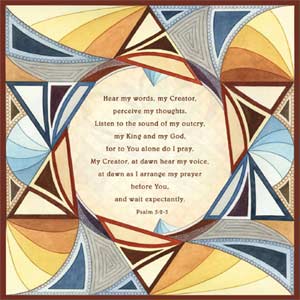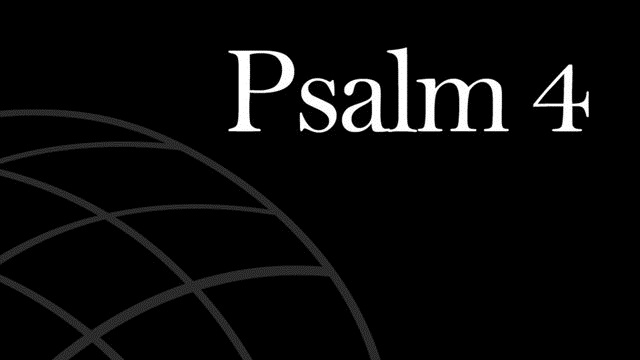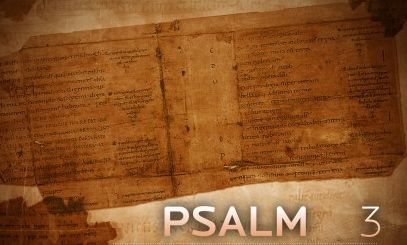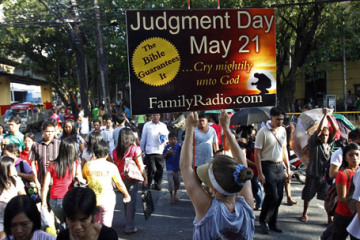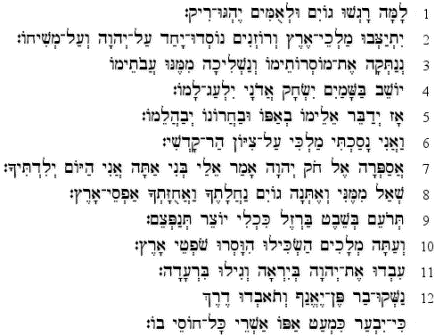In this psalm David takes refuge in God from those who pursue him. His pursuers are graphically depicted as a ravenous lion seeking to tear his life to pieces and drag him away (vv. 1-2). This “pursuit,” however, may be understood as metap horical, in light of verses 3-5, and David is actually facing a trial of false accusation. Thus in verse 1 David cries for deliverance, but in verses 3-5 he prays that if he is indeed guilty of “this”—the following clauses appear as a list of things he is accused of—then let the enemy triumph over him and trample his life into the ground. In this way David protests his innocence against the false charges brought against him, and cries out for deliverance on the basis of this innocence.
horical, in light of verses 3-5, and David is actually facing a trial of false accusation. Thus in verse 1 David cries for deliverance, but in verses 3-5 he prays that if he is indeed guilty of “this”—the following clauses appear as a list of things he is accused of—then let the enemy triumph over him and trample his life into the ground. In this way David protests his innocence against the false charges brought against him, and cries out for deliverance on the basis of this innocence.
Verse 6, again recalling the prayer of Numbers 10:35 (cf. 3:7), is an appeal to God to rise up and execute judgement in his favour. He longs for a solemn assembly with the people gathered around God who is exalted above them, and seated as a judge in his court. For the Lord is a judge, says David, and again he asks for vindication on the basis of his innocence, “according to my righteousness and my integrity that is in me” (v. 8). His prayer is that the righteous God would judge righteously, putting an end to the wicked while establishing the righteous (9). Confidence in his own innocence, and confident in the righteousness of God, David confesses his trust that God is his shield and thus his saviour (10-11).
Verses 12-16 portray the judgement that will befall the wicked if they do not repent. The imagery used of God comes from the military: his sword is sharpened, his weapons prepared, his bow ready with flaming arrows (12-13). The text does not actually say he uses the weapons, however, and verses 14-16 suggest a historical form of judgement in which the evil one prepares for others, returns upon one’s own head. The one who digs a pit for another will fall into it; their mischief and violence will come down on their own head.
The final verse of the psalm is a dedication or vow of praise. It is noteworthy that David at this point has not yet been vindicated, and indeed may never be vindicated from the accusations hurled at him. Nonetheless, assured of his own innocence, and trusting in God as his refuge, the anxiety with which the psalm began finds a resolution, not in actual deliverance from the trial, but in assurance of God’s care and vindication.
*****
There are several points of theological interest in this psalm. The first concerns the identity and person of God. The twin petitions with which the psalm opens are addressed to “O Lord my God.” David’s God is the Lord, a righteous God and a righteous judge who tests the hearts and minds of all, and sits in judgement over the people—including David, vindicating the righteous and holding the wicked accountable for their deeds. God tests the hearts to distinguish the violent and deceitful from those who walk with integrity.
The final words of the psalm are not only the climax of the psalmist’s vow of praise, but a description of the divine identity: Lord Most High. This use of the divine name recalls Melchizedek’s blessing of Abram in Genesis 14:19, in the name of God Most High, possessor of heaven and earth. The psalm asks, therefore, not only what kind of world we live in, but whose world we live in, and so provides an insight into the primary context in which our existence takes place: this is God’s world.
Verses 14-15 seem to suggest that there is a form of natural moral order in the world in which the righteous and the wicked “get what is coming to them.” Care is required here, for it is possible to envisage this as some kind of impersonal moral force which removes God’s direct and personal agency from the picture. Is it simply a matter of tit-for-tat, of what-goes-around-comes-around? Or is God personally engaged with the people he has created and sustains? Unquestionably, the psalm teaches the latter, and God’s judgement is an inevitable aspect of God’s righteousness. According to Craigie (103),
Evil eventually functions like a boomerang, bringing back upon its perpetrators the wickedness planned for others. and there is a sense in which the boomerang of human evil may be identified with the “sword” and “fiery shafts” of divine judgement; God was primed to act against the unrepentant sinner, but the nature of his action was simply to direct the consequences of evil away from the innocent and turn them back upon the perpetrators.
This raises two important questions, however. First, experience suggests that justice is not fully done in this life: some seem to escape the justice their deeds deserve, while others’ apparent innocence or goodness goes without vindication or reward. Judgement within the parameters of history does not always appear. Although this psalm does not raise or address this question, elsewhere in the Bible it is plain to see that God’s role as judge transcends the bounds of history. Numerous passages, especially in the New Testament, depict a final judgement when God’s justice will be fully realised. This subject is deeply unpopular or even frightening in some circles, but this psalm will not allow us to ignore or marginalise the idea of divine judgement. The New Testament certainly deepens our understanding of the subject, and causes us to consider divine judgement through a christological lens. Nevertheless, the spectre of a final judgement remains as an inescapable feature of human existence understood in biblical terms.
Second, is anyone actually righteous? What are we to make of David’s bold claims of righteousness in this psalm? Probably we should understand them not as a claim of perfect sinlessness or absolute righteousness, but as a protestation of innocence in the face of the particular accusations hurled against him by his adversaries. What hope, then, do any of us have if God indeed is a righteous judge, testing the hearts and minds of all people? Who, possibly, could stand unblemished in his presence? Nevertheless there is hope. Judgement is prepared against those who do not repent (v. 12), whereas God saves the upright in heart, and blesses those who take refuge in him (v. 1; cf. 2:12; 5:11). The upright in heart acknowledge the righteousness of God and God’s claim on their lives, and turn to God for mercy and salvation.

